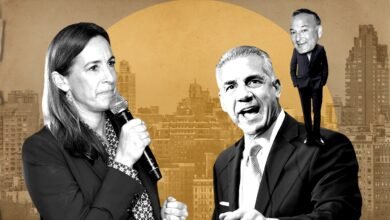NYC Real Estate Braces For Mamdani as Mayor

The crowd on East 76th Street crushed against Zohran Mamdani’s podium, set up across from the Reuben Brothers’ Surrey Hotel for a rally.
“The owners of the Surrey have said ‘we’re in a good place,’” Mamdani stumped, alluding to a quote Jamie Reuben gave the New York Post last year about the building’s luxury condo sales. “And sure, maybe the celebrities who can afford the Surrey, the tourists who can pay $1,300 a night, maybe they are in a good place. I hear the stories of workers who are not in a good place, workers who have been denied the dignity that they have labored towards for so many years.”
It was an overcast August morning, and Mamdani, who won June’s Democratic primary for New York City mayor, had joined the powerful Hotel and Gaming Trades Council in its campaign against Reuben Brothers, which bought the luxury property in 2020 for $150 million.
The hotel union accused the company of failing to rehire workers who were laid off when the Surrey Hotel shuttered during the pandemic, before Reuben Brothers took over and reopened it under the Corinthia brand and converted the upper floors to condos. The union and previous employees argue that this violates city law.
“The new owners tossed out the old workers like they were garbage, like they were trash,” HTC president Rich Maroko chimed in.
Reuben Brothers maintains that “any suggestion of unlawful hiring practices is incorrect,” due to the fact that the firm bought the hotel when it was closed and didn’t have any employees.
The scene, with its duo of worker solidarity and call-out of billionaire owners, played to the campaign’s themes.
“I want us to be so loud that they can hear us in the $50 million penthouse at the top of this building,” Mamdani said, yelling over a garbage truck that threatened to drown out the rally’s speakers.
It also almost perfectly distilled the real estate industry’s anxieties about a Mamdani administration, with owners — and the ultrawealthy in general — painted as villains, and the loyalty of an influential union, which had previously endorsed former Gov. Andrew Cuomo, on display.
But in the lead-up to the general election, the industry’s options for a champion are flawed, to say the least. Cuomo and Mayor Eric Adams, and to a lesser extent, Republican nominee Curtis Sliwa and independent Jim Walden, threaten to split votes and deliver Mamdani a wider margin of victory. Corruption allegations have continued to swarm the Adams administration, as have accusations of coziness with President Donald Trump against both Adams and Cuomo.
Some have found reason to be optimistic: Mamdani has met with business leaders, may heed their concerns and has moderated some of his policy positions that are the furthest to the left. At the same time, he has pushed back on suggestions that he will soften his stance to appeal to more voters. At the Surrey event, he emphasized that freezing rent for stabilized apartments, fare-free buses and universal childcare are nonnegotiables.
“I say those same things, whether I’m on a sidewalk or in a C-suite,” he said. “I am telling everyone about my vision for how to deliver affordability and how we get there.”
Meeting of minds
Real Estate Board of New York leaders Jim Whelan and Jed Walentas met with Mamdani in early August.
“He’s very personable. He’s a very good listener,” Whelan said. “We talked about areas where we are in agreement, areas where we might be in agreement and areas where we are not in agreement.”
Those elusive points of consensus include the need for more density, transit-oriented development and more housing vouchers. (REBNY pushed for the creation of a state-based housing voucher program that was approved in the state budget this year.)
Then there are the major areas of contention, including Mamdani’s pledge to freeze rents for stabilized tenants for four years.
In response to concerns about how a rent freeze would plunge stabilized owners into deeper distress and result in fewer apartments on the market, Mamdani has pitched lowering property taxes (something that would require state action) and creating alternative forms of insurance to curb costs for owners.
“Those other ideas he refers to are beyond his control, and in some cases, relatively untested or have policy tradeoffs,” Whelan said.
“The situation is fluid. People seem to go back and forth.”
Representatives for Mamdani did not return multiple calls and emails seeking an interview for this story.
Joanne Grell, a tenant organizer who co-chairs the freeze-the-rent campaign for the NYS Tenant Bloc, is hopeful that a Mamdani administration, in addition to halting increases on rent-stabilized units, would be able to put pressure on Albany to expand good cause eviction and ramp up enforcement of right-to-counsel laws, which provide free legal representation to tenants facing eviction. She thinks Gov. Kathy Hochul, who hasn’t endorsed Mamdani, will recognize that she needs to have the mayor on her side as she seeks reelection next year.
“It’s working class New Yorkers who are going to decide this election,” she said.
Mamdani has also proposed raising taxes and increasing the amount of money the city borrows to build affordable housing, both of which would require buy-in from Albany.
Grell believes it will be the real estate industry that will need to adapt to a Mamdani administration, rather than the other way around.
“The real estate industry is really going to have to take a look at how they treated tenants in the past and how they will treat them in the future,” she said. “Real estate is put on notice.”
Real estate’s slog
Leading up to the Democratic primary, real estate executives backed Cuomo.
In the wake of his double-digit loss to Mamdani in June, Cuomo’s supporters lamented their candidate’s lackluster campaign, and industry professionals began realigning themselves with Adams’ bid for reelection. That immediate enthusiasm may have waned as the mayor trailed Mamdani, Cuomo and Sliwa in polls released over the last month.
Cuomo himself admitted to NY1 that he “did not run a good campaign” and wasn’t aggressive enough — an uncharacteristic move for a politician often criticized for being “too aggressive, too difficult, too hostile,” he said.
He has since reversed his approach and taken to social media — for instance, releasing TikToks where he strolls toward the camera and talks about affordable housing or takes the Staten Island Ferry — to show that he can run a modern campaign.
He has also found an attack line against Mamdani: that the state Assembly member lives in a rent-stabilized apartment.
Cuomo has proposed what he calls “Zohran’s Law,” a measure that would limit who can rent a stabilized apartment based on income. Specifically, after a regulated apartment becomes vacant, the next tenant would need to be someone who would be paying at least 30 percent of their income toward the apartment’s rent.
Such a change would require action by the state legislature, which is historically resistant to rolling back rent stabilization. Tenant and landlord groups criticized the proposal, the former saying it was a backdoor bid to gut rent stabilization and the latter arguing that such a change would do nothing to address the financial hardship of landlords.
Adams also didn’t miss a chance to weigh in. Referring to Cuomo’s use of rent control and rent stabilization interchangeably on social media, he said in a video posted on social media: “One of my opponents doesn’t understand the difference between rent control and rent stabilization. The other has been using it for his benefits.”
Both Adams and Cuomo have argued that Mamdani’s socialist politics don’t fit in New York City.
“This city is all about capitalism, not socialism. If you are anti-capitalist, you are anti-business, anti-corporation,” Cuomo said at a press conference in August. “That’s economic death for New York City. Why would they come here? Why would they stay here if literally the leadership is anti-them?”
Mamdani has pointed to the various corruption cases surrounding the Adams administration (including the criminal charges against the mayor in April) and the multiple allegations of sexual misconduct against Cuomo that led to his resignation as governor in 2021.
One real estate source predicted that the industry will not spend as heavily on the mayoral race, especially when it comes to super PACs backing the candidates, as they did ahead of the Democratic primary. That could change if someone drops out of the race, but none have given any indication that they are willing to call it quits.
Some appear to be watching and waiting. RXR’s Scott Rechler, who indicated last month he was open to supporting Adams, has not formally decided whom to support. He previously donated $250,000 to Fix the City, a super PAC tied to Cuomo.
“Clearly, there’s no consensus, or unanimity of opinion on whose opinion is better,” developer Bruce Teitelbaum said. “Things could change.”
He wouldn’t specify his candidate, though he noted that he’s known both Cuomo and Adams for a long time.
“The situation is fluid,” he added. “People seem to go back and forth.”
Inside a Mamdani administration
Imagine it’s Nov. 5, the day after Mamdani has been elected as the next mayor of New York City.
Doomsday predictors would say the result will drive the city’s wealthy to Florida.
But if Mamdani wins, he’ll encounter limitations faced by all mayors.
“Much of what Mamdani promises actually falls outside of mayoral authority, and is really driven by state legislation and the governor,” real estate attorney Sherwin Belkin said. He noted that freezing rents for stabilized apartments may be within Mamdani’s reach, though he believes promising to do so for four years — before the city’s rent board has even considered the matter — is “palpably illegal.”
Belkin added that to prepare for this scenario, property owners may want to cut back on offering preferential rent or other concessions on stabilized apartments.
Though Mamdani has pushed back on the idea of softening his policy positions, he has adjusted how he talks about certain issues, such as the war in Gaza and public safety. For example, he has repeatedly said he is not running to defund the police, in response to questions about statements he made on social media in 2020 to cut the NYPD’s budget: “Defund it. Dismantle it. End the cycle of violence,” he wrote at the time.
Even at the event in August with the hotel union, he appeared to temper his response to a question about the competition to add three new casinos in New York. The casinos are a major priority for the union.
He may also surround himself with some people whom industry players feel they can work with. Mamdani has held up Mayor Bill de Blasio as his favorite mayor; de Blasio was no favorite of the real estate industry, but he did bring on people who spoke the industry’s language, such as Alicia Glen, who came from Goldman Sachs to serve as his deputy mayor for housing and economic development.
Comptroller Brad Lander, who cross-endorsed Mamdani during the primary, thinks there are a number of reasons that the industry should feel optimistic about a Mamdani administration.
“He is centering affordability in the campaign; for people who care about housing affordability, that’s good news,” he said. “Most industry leaders that I talk to agree that affordability is one of the biggest problems.”
When asked if he hopes to join the Mamdani administration (perhaps as the housing czar or head of City Planning), Lander demurred and said he’s focused on helping him get elected.
Lander also pointed to a June interview Mamdani gave the New York Times. Asked “What’s one issue in politics that you’ve changed your mind about,” he responded: “The role of the private market in housing construction.” He went on to say that he now recognizes “there is a very important role to be played.”
Mamdani’s campaign website still warns that the city “can’t afford to wait for the private sector to solve this crisis.” But Lander sees the June response as significant.
“He could have chosen a lot of things to say,” Lander said. “I would encourage people to take stock of that.”
“I think that Zohran has gone well more than halfway in reaching out in that conversation,” Lander added. “I hope more people will take him up on it.”




